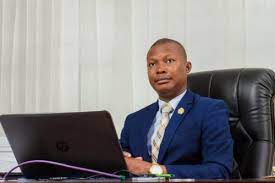By Hassan Osman Kargbo
The Director General of the National Petroleum Regulatory Agency (NPRA), Mr. Brima Baluwa Koroma, has strongly defended Sierra Leone’s petroleum sector during the Ministry of Information and Civic Education’s weekly press briefing held at the Miatta Conference Hall in Freetown.
Addressing the media, Mr. Koroma presented a progress report on reforms and achievements in the sector, while challenging what he described as widespread misinformation and unfair public scrutiny.
Recalling the dire state of the petroleum sector five years ago, he painted a picture of chronic fuel shortages, black-market activity, and widespread consumer frustration. “Back then, our stock levels hovered around 7 to 10 days. The system was unstable and vulnerable to shocks,” he noted.
Today, according to Koroma, Sierra Leone has achieved what he termed “stock balance stability,” maintaining daily fuel distribution levels of up to 278,000 litres with a nationwide consumption rate of over 1.3 million liters. He credited strategic infrastructure investments and regulatory reforms for stabilizing the supply chain.
“The sector now contributes more than 12 percent to domestic revenue,” he said, adding that year-on-year growth has been steady since 2018, despite global economic disruptions. New fuel storage facilities in Kenema, Bonthe, Kambia, and Port Loko have helped to improve access and buffer against shortages.
Under the recently enacted Petroleum Regulatory Act, the NPRA has been granted enhanced legal authority to enforce minimum reserve requirements. All licensed fuel importers are now mandated to maintain at least 25,000 metric tons of fuel in reserve or face suspension.
“This is no longer business as usual,” Koroma warned. “Operators who fail to meet their reserve obligations will be penalized. We are serious about accountability.”
He also highlighted an increase in sector diversity, noting that the number of licensed fuel importers has grown from just three major players to over ten, including youth-led and indigenous businesses. This, he said, is a sign of growing local participation and market competitiveness.
However, Koroma reserved sharp criticism for some media outlets and online commentators whom he accused of distorting facts and fueling public anxiety. “When we do good work, some people twist half-information to stir confusion. They cause panic, but the data doesn’t lie,” he said, referencing recent public concerns over fluctuating fuel prices.
He clarified that the current retail pump prices, ranging from Le26 to Le28 per litre, are not solely determined by the NPRA. He cited external factors including geopolitical tensions in the Middle East and disruptions in the global oil supply chain as key drivers of price volatility.
“Sierra Leone operates an open-market system, which means we are directly affected by international crude prices and foreign exchange rates,” he said.
Despite being unable to control global pricing, Koroma said the NPRA has prioritized transparency in the local market. He pointed to improved monitoring of fuel pumps, enhanced audit practices, and stricter distribution checks. “We now monitor 10-meter pumps to ensure that if you pay for 10 litres, you receive exactly 10 litres,” he emphasized.
While acknowledging lingering structural challenges—such as dependency on imports, outdated legislation, and infrastructure constraints—Koroma reaffirmed NPRA’s commitment to consumer protection and sector reform.
“We are not saying everything is perfect,” he concluded. “But let us not use sentiment to disrupt a sector that is finally becoming accountable. The fuel market is responding to policy, not manipulation.”











